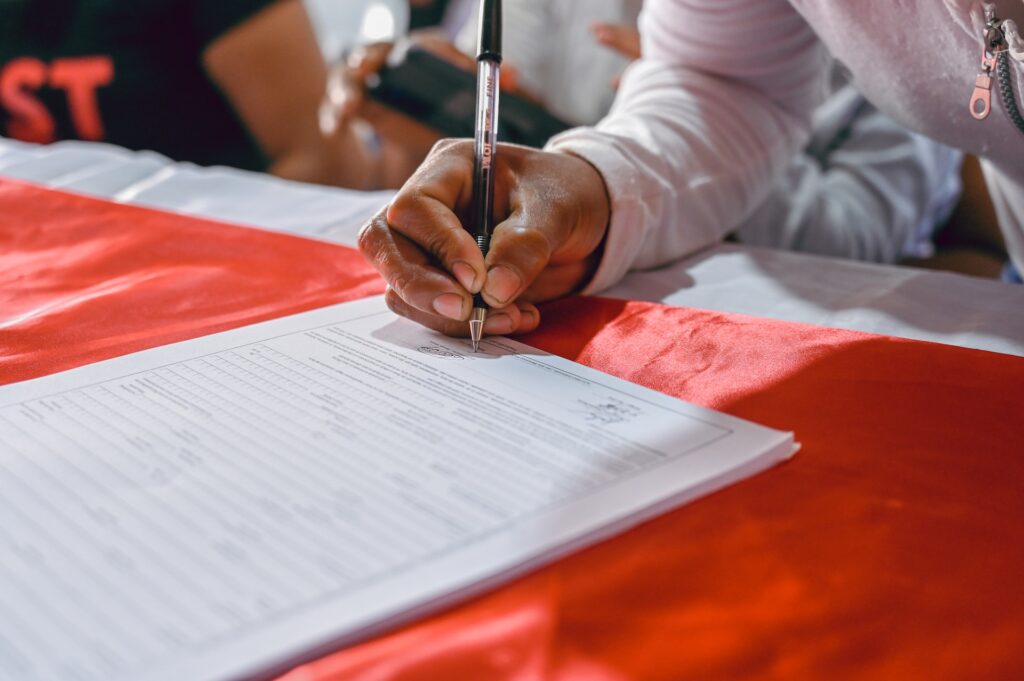One of the most common questions surrounding the world of notarization revolves around its discretion – can a notary refuse to notarize a document? Should they even do so?
This is the inquiry this article aims to answer. We’ll also explain the most common causes for notarization declines, and under which cases refusing to notarize a document can be illegal.
Can a notary refuse to notarize a document?
The short answer is yes – notaries can refuse to notarize a document. However, it’s essential to clarify that notaries should, in general, honor all requests to notarize something – so long as they are reasonable and legal, and the signers present proper identification.
After all, the notary’s role is not to be an obstacle, but rather to facilitate the notarization process while upholding the law and ethical standards. Their role is crucial for ensuring authenticity and legal validity when dealing with documents. As such, notaries aim to assist individuals with their needs.
However, there are instances where notarization should, and legally must, be declined. These cases will almost always fall into two distinct categories: situations where notaries are forbidden from notarizing documents, and cases where notaries may refuse to notarize a document based on their discretion alone.
You may also like: How much does a mobile notary cost? Understanding the expenses

Cases where a notary may refuse to notarize a document
The most common scenario happens when the signer is not physically present, though there are exceptions. Remote notarization is an option for some documents, but even then the signer must personally appear in front of the notary. Otherwise, this might happen.
The signer might fail to provide satisfactory evidence of identification, in which case notaries must refuse to notarize a document. Or the document could lack the signer’s original, wet-ink signature, which is a fundamental requirement to verify the document’s authenticity.
Another frequent occurrence involves incomplete or blank documents. Notaries should never notarize a document left incomplete or even entirely blank, which is a grave mistake. It must be filled out with accurate, factual information before the process can even be considered.
These professionals are also ethically bound to refuse notarization when they find themselves as the signer of the document in question. This restriction also applies to close family members, like their spouse, parents, or children, which helps ensure impartiality and enforce ethical standards. Additionally, notarization must be refused when notaries have a financial interest in the transaction or are a party to it.
Notaries are also bound to decline notarization in the case of signers who have been deemed mentally incapacitated and not officially restored to capacity. This restriction is especially important to protect vulnerable individuals from potential exploitation, the consequences of which the signer may not understand.
Following the above, notaries must always be vigilant and perceptive, acting right away if they believe the signer is being coerced or does not fully understand the legal implications of signing the document. In such cases, notaries must exercise their discretion and refuse notarization to protect the signer’s interests. This also applies if the signer appears to be an in impaired state – which includes being drunk, sedated, or disoriented.
In situations where the signer does not speak English, and there is no one readily available to translate the document into a language the signer understands, notarization must not proceed. Effective communication is critical to ensure the signer fully understands what lies within the document.
When the document lacks a prepared notary certificate, and the signer cannot specify the required notarial act, it could become impossible to proceed. Notaries need a clear understanding of the notarial act required to correctly perform their duties.
Finally, notaries must refuse to notarize documents they know or believe to be illegal, false, or deceptive. Doing so will likely result in hefty fines or worse – criminal charges for forgery or fraud.
When should notaries never refuse to notarize a document?
While notaries are bound by specific rules and regulations to decline certain requests, they should not refuse to perform a notarial act when it is lawful and within their jurisdiction. In other words, they are prohibited from letting their personal biases and beliefs affect their notarial duties.
Below are some instances when notaries should not refuse to notarize an otherwise legal document:
- Personal bias and discrimination: notaries should never refuse to notarize a document based on personal biases related to the signer’s race, age, gender, religion, nationality, lifestyle, or disabilities. Discrimination on these grounds is unlawful and contrary to the principles of equal access to notary services;
- Document content and personal beliefs: adding to the above, even if a notary personally disagrees with the content of a document or finds it too controversial, it should never be the reason to refuse notarization. As long as the document is lawful and adheres to current notarial regulations, the professional should remain impartial and perform their duties. This also applies in cases where the notary feels personal discomfort with a situation or document;
- Document signer’s character: a notary’s judgment of the signer’s character, trustworthiness, or past actions should never influence the decision to notarize a document. As long as the notary can properly identify the signer and validate the document’s authenticity, their personal opinions about the signer should not come into play.
All in all, notaries are entrusted to serve as the state’s impartial witness to the signing of documents. For this reason, they should never let personal biases, disagreements, and uneasiness interfere with their obligation to provide notarial services per the law and current ethical standards.
Conclusion
Even though notaries should strive to honor all notarization requests, they also have the responsibility to decline them in specific situations, as covered throughout this article.
In short, they may refuse to act when legal, ethical, and professional standards are not met. However, it’s imperative to remember that notaries must uphold the law and never let personal biases and disagreements interfere with their critically impartial role.
Looking for professional mobile notarization services?

If you require professional mobile notary services around Orlando and Central Florida, trust no other than Mobile Notary Orlando. Our commitment to professionalism, discretion, and efficiency is paramount in ensuring that your notarial needs are met with precision and integrity.
Be it a simple photocopy certification or those daunting real estate-related documents, our agents will come to you wherever you are. You may call or text us at any time and we’ll be there at the scheduled time!






